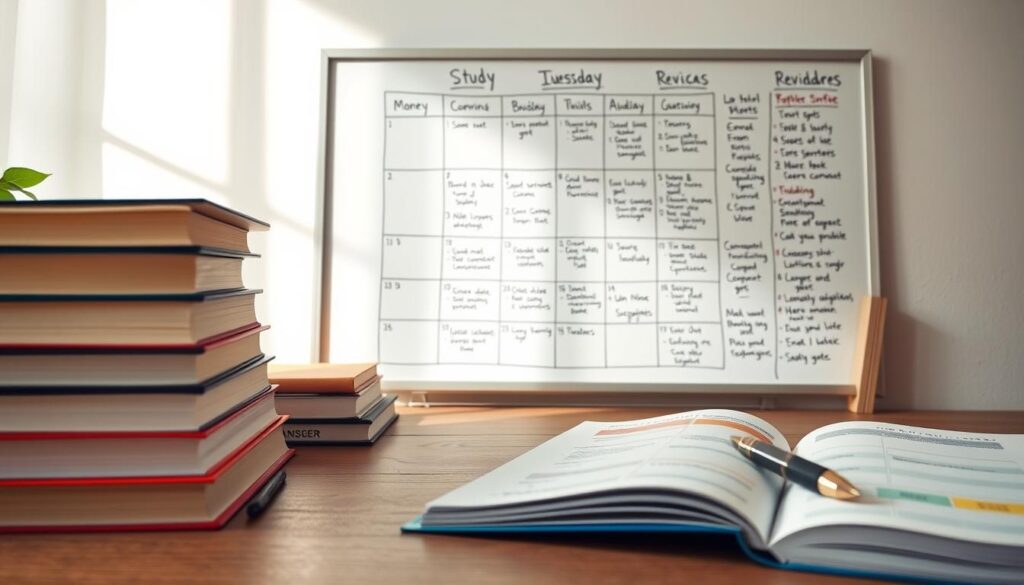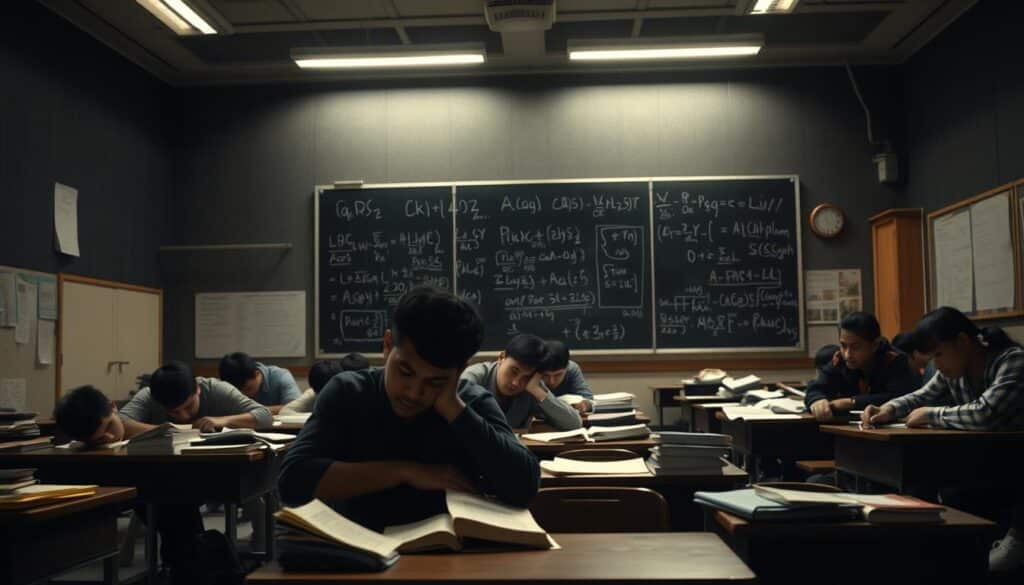Did you know that over 800,000 students in the UK take GCSE exams each year, while approximately 300,000 pursue A-Levels? These qualifications are pivotal in shaping academic and career paths, yet many students struggle to achieve their desired grades.
GCSEs lay a broad foundation across various subjects, while A-Levels demand in-depth mastery and critical thinking. Mastering these exams requires strategic planning, consistent revision, and effective study techniques. However, common pitfalls like poor time management and underestimating subject complexity can hinder success.
A private tutor can provide personalized guidance, helping students overcome challenges and excel. This article will explore how tutoring can transform learning outcomes, offering valuable insights for students and parents navigating the UK education system.
Key Takeaways
- GCSEs provide a broad educational foundation, while A-Levels require specialized knowledge and critical analysis.
- Effective study strategies, such as active recall and spaced repetition, can significantly improve retention rates.
- Common mistakes include mismanaging revision time and underestimating subject complexity.
- A private tutor offers personalized learning and immediate feedback, enhancing academic performance.
- Practicing exam questions and managing time effectively are crucial for success in GCSE and A-Level exams.
The Essentials of GCSE and A Levels
Understanding the differences between GCSE and A-Level qualifications is crucial for students and parents navigating the UK education system. These qualifications play a significant role in shaping academic and career paths, yet their structures and purposes are often misunderstood.
Understanding the Foundations of GCSE
GCSEs, or General Certificate of Secondary Education, are exams typically taken at the end of secondary school. They provide a broad foundation across various subjects, including English, mathematics, science, and humanities. These qualifications are essential for further education and career opportunities, as they demonstrate a student’s ability to handle a wide range of subjects.

GCSE assessments include exams, coursework, and practicals, designed to evaluate a student’s knowledge and skills. The grades obtained in GCSEs often determine the path students take next, whether it’s pursuing A-Levels, vocational courses, or entering the workforce.
Key Differences with A-Level Studies
A-Levels, or Advanced Levels, are specialized qualifications that require in-depth study of selected subjects. Unlike GCSEs, A-Levels focus on a narrower range of subjects, allowing students to develop expertise in areas they are passionate about. This shift from broad to specialized learning prepares students for higher education and professional careers.
The transition from GCSE to A-Level involves more independent learning and complex coursework. Students must adapt to higher academic expectations and develop critical thinking skills to excel in their chosen subjects. Understanding these differences is vital for making informed decisions about educational pathways.
Deep Dive into A-Level Studies
A-Level studies are a two-year course that demands detailed analysis, independent research, and increased academic rigor. Students typically select three to four subjects to focus on, allowing for subject specialization that leads to deeper understanding.
A-Level studies are designed to prepare students for university life by developing analytical skills and self-directed study habits. The challenges include longer essays, complex problem-solving, and the need for critical thinking. Effective time management and tailored study methods are crucial to overcoming these challenges.
For example, academic rigor in A-Level subjects translates to enhanced career and educational opportunities. Students who excel in these courses often find themselves better prepared for the demands of higher education and professional careers.
Key Strategies for Excelling in GCSE and A Level
Mastering GCSE and A-Level exams requires more than just attending classes. It demands a well-structured approach to study and revision. Students and parents often seek effective strategies to ensure academic success without unnecessary stress. Below are some proven methods to help achieve this balance.
Crafting a Realistic Study Timetable
A well-planned study timetable is essential for covering all subjects evenly. Experts recommend breaking down study sessions into manageable chunks, using techniques like the Pomodoro method. This involves working for 25 minutes, followed by a short break. Such a schedule helps maintain focus and prevents burnout.

Setting measurable goals is another key aspect. By breaking topics into smaller segments and tracking progress, students can stay motivated. This approach ensures that no subject is overlooked and allows for timely adjustments as needed.
Effective Revision and Continuous Engagement
Daily revision is crucial for building a strong academic foundation. Techniques like summarizing topics, using flashcards, and practicing with past papers enhance retention and understanding. These active methods are far more effective than passive studying.
Regular practice with past papers helps students get used to exam formats and time constraints. This familiarity can significantly boost confidence and performance. Additionally, incorporating mind maps and visual diagrams connects different concepts, improving recall during exams.
By implementing these strategies, students can achieve better grades and foster long-term academic development. Balancing exam preparation with other responsibilities becomes manageable, leading to overall success in their educational journey.
Techniques to Master A-Level Content
Mastering A-Level content requires a strategic blend of independent learning and analytical skills. These qualifications demand a deeper understanding and application of knowledge, making effective study techniques essential for success.
Independent Learning and Analytical Approaches
Independent learning is the cornerstone of A-Level success. Students should adopt a proactive approach by conducting their own research to supplement classroom lessons. This can involve exploring academic journals, reputable online resources, and educational apps. By taking charge of their learning, students can gain a deeper understanding of complex topics.
Developing analytical skills is equally important. Techniques such as comparative analysis and critical questioning encourage students to think deeply about their subjects. Applying theoretical knowledge to practical case studies helps bridge the gap between concepts and real-world applications. This method not only enhances retention but also prepares students for the analytical demands of higher education.
Practical Application of Knowledge
Hands-on practice is crucial for mastering A-Level content, especially in subjects like science. Engaging in experiments, projects, and assignments allows students to apply theoretical knowledge in practical scenarios. This approach reinforces understanding and builds confidence in tackling complex problems.
Utilizing past exam papers is another effective strategy. Practicing with these materials helps students become familiar with exam formats and time constraints. Reviewing past papers with detailed solutions or teacher feedback can clarify difficult concepts and improve problem-solving skills. This practice not only prepares students for exams but also equips them with skills valuable for future academic pursuits.

By combining independent learning, analytical thinking, and practical application, students can achieve their desired grades and build a strong foundation for their future. These techniques ensure that students are well-prepared for the challenges of A-Level exams and beyond.
Common Pitfalls in A-Level Preparation
Preparing for A-Level exams can be challenging, and many students fall into common traps that hinder their success. Being aware of these pitfalls is the first step toward avoiding them and achieving better grades.
Time Management and Overlooking Coursework
One of the most common mistakes is poor time management. Many students procrastinate, leaving revision until the last minute. This approach often leads to rushed study sessions and inadequate preparation. Effective time management is crucial for covering all subjects evenly and ensuring ample time for revision.
Neglecting coursework and controlled assessments is another pitfall. These components can significantly impact final grades, yet some students underestimate their importance. Regular engagement with coursework and seeking feedback from teachers can help students stay on track and improve their performance.
Misunderstanding Subject Complexity
Some students misjudge the depth of their subjects, leading to inadequate preparation. Understanding the complexity of A-Level subjects is essential for developing effective study strategies. For example, science subjects often require hands-on practice, while humanities may demand extensive reading and analysis.
Additionally, students may struggle with setting clear study goals and prioritizing subjects. Creating a structured study plan and focusing on weaknesses can help students allocate their time more effectively. Recognizing these challenges early allows for better preparation and strategic planning.

Overcoming Struggles Through Private Tutoring
Recognizing when a student needs extra academic support is a crucial step toward their success. At our tutoring center, we understand that every student learns differently, and sometimes, classroom teaching isn’t enough. Private tutoring offers a personalized approach that can make a significant difference in a student’s academic journey.
Identifying When Extra Help Is Needed
- Struggling with specific subjects or topics despite regular study
- Declining grades or difficulty keeping up with coursework
- Lack of confidence in tackling exam questions
Our experienced tutors work closely with students to identify learning gaps and create tailored study plans. With private tutoring, students receive immediate feedback and guidance, helping them clarify difficult concepts and improve their study skills. This personalized attention is especially beneficial for students preparing for challenging A-Level exams, where in-depth understanding and critical thinking are essential.
By addressing these challenges early, we empower students to achieve their academic goals and build a strong foundation for future success. Investing in professional tutoring is a valuable step toward ensuring your child’s educational journey is both successful and fulfilling.
How Private Tutors Improve Your Performance
Private tutors play a vital role in enhancing academic success by offering tailored support. They adapt their teaching methods to match each student’s learning style, ensuring a personalized approach that addresses individual needs and goals.
Personalized Learning and Immediate Feedback
A key advantage of private tutoring is the ability to craft customized study plans. These plans are designed based on a diagnostic assessment of the student’s strengths and weaknesses, ensuring that learning is both effective and efficient. For instance, tutors can focus on areas where the student needs improvement, breaking down complex topics into manageable parts for better understanding and retention.
Immediate feedback is another crucial benefit. Tutors provide constructive criticism, helping students correct mistakes and refine their skills. This direct interaction allows for a deeper understanding of the subject matter, as students can ask questions and clarify doubts on the spot. Regular practice with past exam papers, coupled with detailed feedback, familiarizes students with exam formats and content, boosting their confidence and performance.
Success stories abound where tailored tutoring has led to significant improvements in grades and confidence. For example, students who struggled with specific subjects often find renewed success after working with a dedicated tutor. This personalized attention not only enhances academic abilities but also fosters a growth mindset, essential for overcoming challenges in education and beyond.
Choosing the right tutor is equally important. A supportive learning environment can make a significant difference in a student’s academic journey. Parents are encouraged to utilize free tutor matching services, such as getutor.com.hk/en/findtutor, to connect with highly qualified educators who can provide the necessary guidance and support.
- Customized study plans tailored to individual learning styles and academic goals.
- Immediate, constructive feedback to correct errors and refine skills.
- Focus on weak areas to build competence in complex subjects.
- Improved exam performance and confidence through targeted support.
- Supportive learning environments that foster academic and personal growth.
By addressing these challenges early, students can achieve their academic goals and build a strong foundation for future success. Investing in professional tutoring is a valuable step toward ensuring your child’s educational journey is both successful and fulfilling.
Supplementary Resources and Study Tips
Enhancing your study routine with the right resources can make a significant difference in academic success. Students and parents can benefit from a variety of online platforms and practice materials designed to support learning.
Popular online revision platforms such as Khan Academy and Quizlet offer thousands of practice questions and past papers for both GCSE and A-Level subjects. These tools provide interactive learning experiences, making complex topics more engaging and easier to grasp.
Video tutorials and interactive quizzes are particularly useful for visual learners. They help students understand difficult concepts through different learning styles, enhancing retention and understanding.
Study apps like Trello and Forest are excellent for organizing revision sessions and tracking progress. These tools help students stay focused and maintain a structured study schedule, leading to better time management and productivity.
Integrating these resources into daily study routines can lead to improved retention and exam results. Parents are encouraged to support a balanced approach that combines traditional textbooks with modern digital tools, ensuring a well-rounded study experience.
Conclusion
Understanding the progression from GCSE to A-Level is key to academic success. While GCSEs provide a broad foundation, A-Levels demand specialized knowledge and critical thinking. To excel, students must adopt structured study strategies and personalized timetables.
Effective revision techniques, such as practicing past papers and using active recall, significantly enhance performance. Tackling challenging subjects requires independent learning and analytical skills, which can be refined with expert guidance.
Common pitfalls like poor time management can hinder progress, but targeted tutoring offers personalized support and immediate feedback. This structured approach helps bridge learning gaps and builds confidence.
For parents and students seeking academic success, utilizing expert tutoring services is a valuable step. Free tutor matching services can connect you with qualified educators, ensuring a tailored learning experience.
Invest in your future today and explore how professional tutoring can transform your educational journey. Secure the support needed to achieve your academic goals and thrive in your studies.
FAQ
What are the key differences between GCSE and A-Level qualifications?
GCSEs are foundational qualifications typically taken at the end of secondary school, covering a broad range of subjects. A-Levels, however, are advanced qualifications that focus on specialized subjects, preparing students for higher education or professional paths. Both are critical milestones in a student’s academic journey.
How can I help my child excel in their GCSE studies?
Encourage a structured study timetable, regular revision, and active engagement with the course material. Identifying areas where your child may need extra support early on can significantly impact their performance. Consider pairing them with a qualified tutor for personalized guidance.
What makes A-Level studies more challenging than GCSEs?
A-Level studies demand a higher level of academic rigor, requiring students to develop advanced analytical and critical thinking skills. The curriculum is more specialized, and the expectations for independent learning are greater. Effective time management and a deep understanding of the subject matter are essential for success.
How do I know if my child needs additional tutoring support?
If your child is struggling with specific subjects, showing signs of academic stress, or needs help meeting grade targets, it may be time to consider a private tutor. A tutor can provide personalized attention and help bridge gaps in understanding, ensuring your child feels confident and prepared.
What resources are available to supplement my child’s learning?
In addition to textbooks, there are many online tools, practice materials, and educational apps that can enhance your child’s study routine. We also recommend integrating past exam papers and seeking guidance from experienced educators to reinforce learning outcomes.
How can I ensure my child develops effective study habits?
Establishing a consistent study routine, setting clear academic goals, and encouraging active participation in class are key strategies. Regular communication with teachers and tutors can also provide valuable insights into your child’s progress and help identify areas for improvement.
What role does time management play in achieving good grades?
Time management is crucial for balancing schoolwork, revision, and extracurricular activities. Creating a realistic timetable helps students prioritize tasks, meet deadlines, and allocate sufficient time for studying and reviewing course material.
How can a private tutor improve my child’s academic performance?
A private tutor offers one-on-one attention, tailoring lessons to your child’s learning style and pace. They provide immediate feedback, clarify complex concepts, and help build confidence, leading to improved academic results and a stronger foundation for future studies.
What are the benefits of focusing on practical applications of knowledge?
Applying knowledge practically helps students connect theoretical concepts to real-world scenarios, enhancing their understanding and retention. This approach also fosters critical thinking and problem-solving skills, which are invaluable for both academic and professional success.
How can I track my child’s progress in their studies?
Regular communication with teachers, reviewing progress reports, and maintaining open dialogue with your child about their academic experiences are effective ways to monitor their progress. Additionally, working with a tutor can provide additional insights and support to ensure your child is on the right track.


